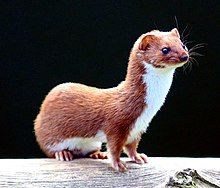Mustela
| Weasel | |
|---|---|
 |
|
| Least weasel | |
| Scientific classification | |
| Kingdom: | Animalia |
| Phylum: | Chordata |
| Class: | Mammalia |
| Order: | Carnivora |
| Suborder: | Caniformia |
| Family: | Mustelidae |
| Subfamily: | Mustelinae |
| Genus: |
Mustela Linnaeus, 1758 |
| Type species | |
|
Mustela erminea Linnaeus, 1758 |
|
| Species | |
 |
|
A weasel /ˈwiːzəl/ is a mammal of the genus Mustela of the family Mustelidae. The genus Mustela includes the least weasels, polecats, stoats, ferrets, and minks. Members of this genus are small, active predators, with long and slender bodies and short legs. The family Mustelidae (which also includes badgers, otters, and wolverines) is often referred to as the "weasel family". In the UK, the term "weasel" usually refers to the smallest species Mustela nivalis.
Weasels vary in length from 173 to 217 mm (6.8 to 8.5 in), females being smaller than the males, and usually have red or brown upper coats and white bellies; some populations of some species moult to a wholly white coat in winter. They have long, slender bodies, which enable them to follow their prey into burrows. Their tails may be from 34 to 52 mm (1.3 to 2.0 in) long.
Weasels feed on small mammals and have from time to time been considered vermin because some species took poultry from farms or rabbits from commercial warrens. They do on the other hand eat large numbers of rodents. They can be found all across the world except for Antarctica, Australia, and neighboring islands.
The English word "weasel" was originally applied to one species of the genus, the European form of the least weasel (Mustela nivalis). This usage is retained in British English, where the name is also extended to cover several other small species of the genus. However, in technical discourse and in American usage, the term "weasel" can refer to any member of the genus, or to the genus as a whole. Of the 17 extant species currently classified in the genus Mustela, 10 have "weasel" in their common names. Among those that do not are the stoat, the , the ferret, and the European mink. The American mink and the extinct sea mink were commonly included in this genus as Mustela vison and Mustela macrodon respectively, but in 1999 were moved to the genus Neovison.
...
Wikipedia
